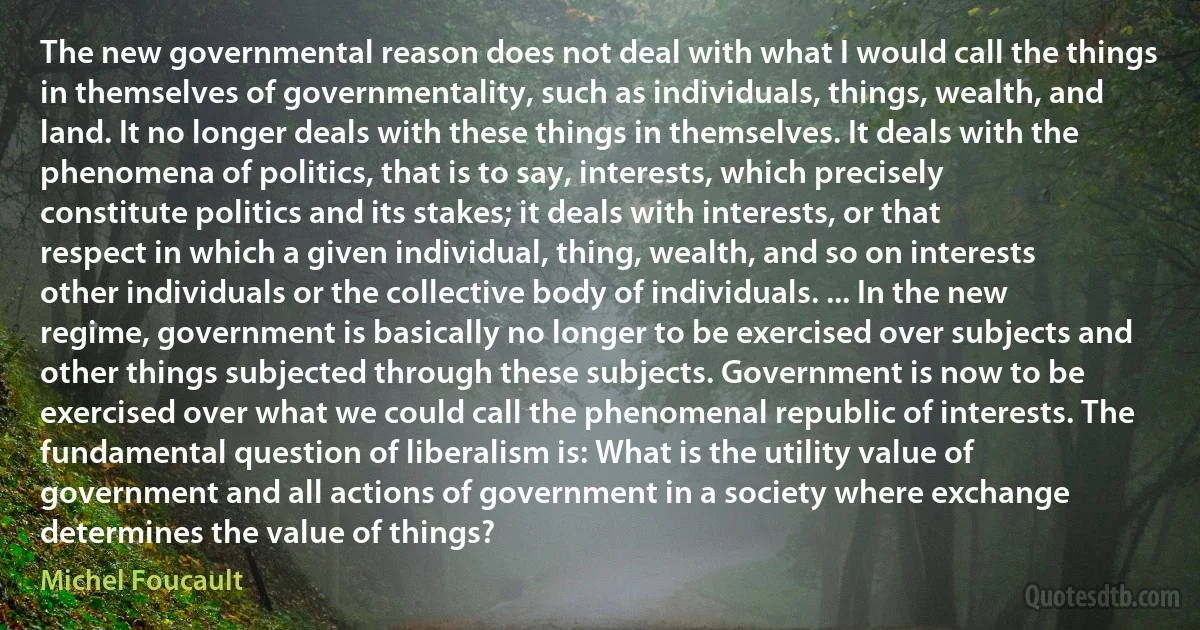
The new governmental reason does not deal with what I would call the things in themselves of governmentality, such as individuals, things, wealth, and land. It no longer deals with these things in themselves. It deals with the phenomena of politics, that is to say, interests, which precisely constitute politics and its stakes; it deals with interests, or that respect in which a given individual, thing, wealth, and so on interests other individuals or the collective body of individuals. ... In the new regime, government is basically no longer to be exercised over subjects and other things subjected through these subjects. Government is now to be exercised over what we could call the phenomenal republic of interests. The fundamental question of liberalism is: What is the utility value of government and all actions of government in a society where exchange determines the value of things?
Michel FoucaultRelated topics
body call deal fundamental given government land liberalism longer now politics question reason regime respect say thing utility value wealth thingsRelated quotes
We should take counsel of both nature and art in the consideration of this question. When the architect intends a grand structure, he makes the foundation broad and strong. We should imitate this prudence in laying the foundations of the future Republic. There is a law of harmony in all departments of nature. The oak is in the acorn. The career and destiny of individual men are enfolded in the elements of which they are composed. The same is true of a nation. It will be something or it will be nothing. It will be great, or it will be small, according to its own essential qualities. As these are rich and varied, or pure and simple, slender and feeble, broad and strong, so will be the life and destiny of the nation itself. The stream cannot rise higher than its source. The ship cannot sail faster than the wind. The flight of the arrow depends upon the strength and elasticity of the bow, and as with these, so with a nation.

Frederick Douglass
In order that woman should reach the same standard as man, she ought, when nearly adult, to be trained to energy and perseverance, and to have her reason and imagination exercised to the highest point; and then she would probably transmit these qualities chiefly to her adult daughters. The whole body of women, however, could not be thus raised, unless during many generations the women who excelled in the above robust virtues were married, and produced offspring in larger numbers than other women. As before remarked with respect to bodily strength, although men do not now fight for the sake of obtaining wives, and this form of selection has passed away, yet they generally have to undergo, during manhood, a severe struggle in order to maintain themselves and their families; and this will tend to keep up or even increase their mental powers, and, as a consequence, the present inequality between the sexes.

Charles Darwin
In reviewing the several levels of life which morality defines, we may observe two types of universal value. The lower values m relation to the higher are indispensable. There is no health without satisfaction, no achievement without health, no rational intercourse without achievement, and no true religion except as the perfecting and completing of a rational society. The higher values, on the other hand, are more universal than the lower in that they surpass these in validity, and are entitled to preference. Thus the lower values are ennobled by the higher, while the higher are given body and meaning by the lower. Satisfaction derives dignity from being controlled by the motive of good-will, while the moral kingdom at large derives its wealth, its pertinence to life, and its incentive, from the great manifold of particular interests which it conserves and fosters.

Ralph Barton Perry
My friends, the Republican Party did not win the midterm election in November: We lost that election. We lost because voter turnout was abysmally, embarrassingly low, and millions of working people, young people and people of color gave up on politics as usual and they stayed home. That's a fact. In my view, Democrats will not retain the White House, will not regain the Senate or the U.S. House, will not be successful in dozens of governor races across the country, unless we generate excitement and momentum and produce a huge voter turnout. With all due respect – and I do not mean to insult anyone here – that turnout, that enthusiasm, will not happen with politics as usual. The people of our country understand that given the collapse of the American middle class, and given the grotesque level of income and wealth inequality we are experiencing, we do not need more establishment politics or establishment economics.

Bernie Sanders
Today there is a new class hostile to business in general, and especially to large corporations. As a group, you find them mainly in the very large and growing public sector and in the media. They share a disinterest in personal wealth, a dislike for the free-market economy, and a conviction that society may best be improved through greater governmental participation in the country's economic life. They are the media. They are the educational system. Their dislike for the free-market economy originates in their inability to exercise much influence over it so as to produce change. In its place they would prefer a system in which there is a very large political component. This is because the new class has a great deal of influence in politics. Thus, through politics, they can exercise a direct and immediate influence on the shape of our society and the direction of national affairs.

Irving Kristol
